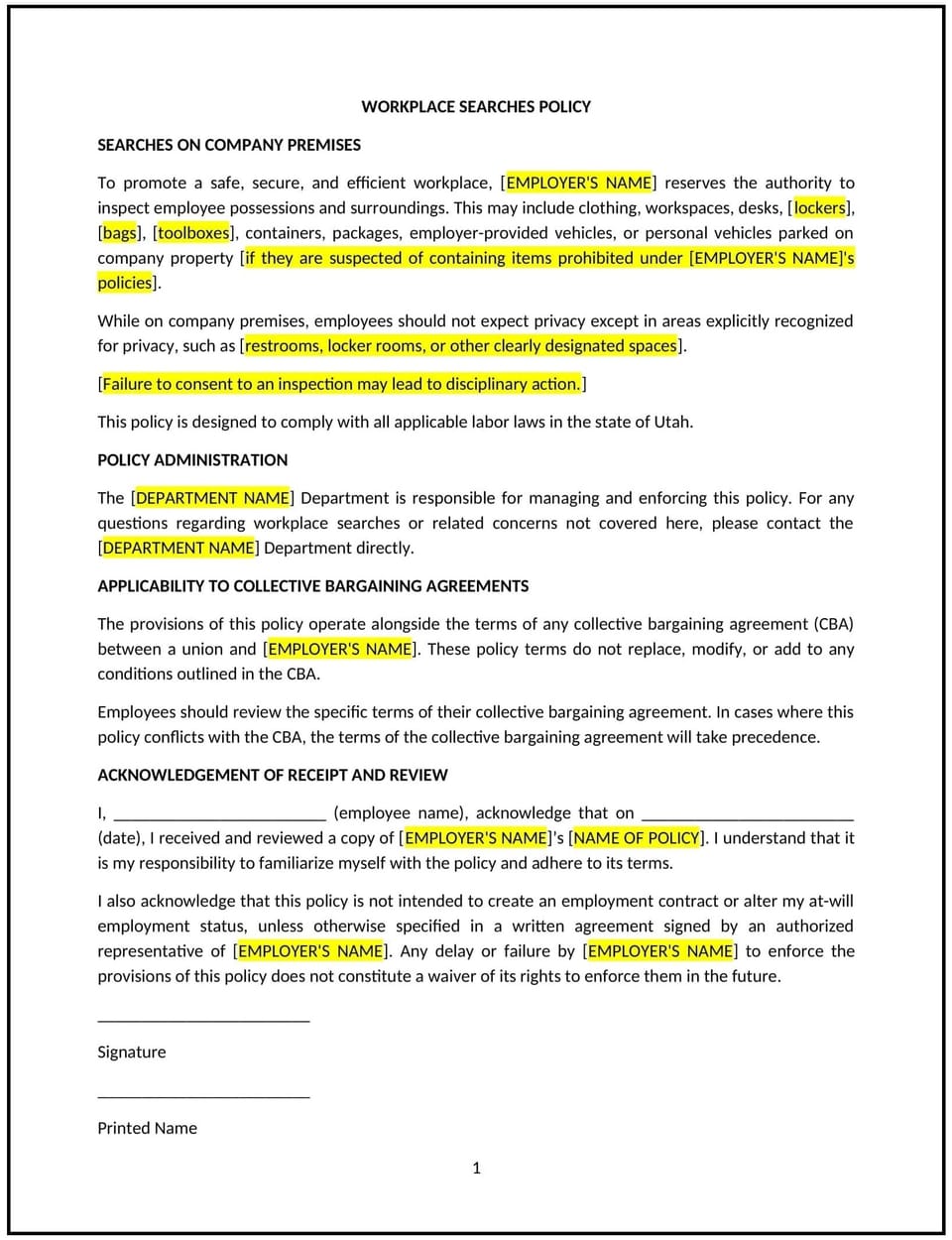Workplace searches policy (Utah): Free template

Workplace searches policy (Utah)
This workplace searches policy is designed to help Utah businesses create guidelines for conducting searches in the workplace. It outlines procedures for searching employees, their belongings, and company property to maintain security and prevent theft or misconduct.
By adopting this policy, businesses can protect company assets, maintain a secure work environment, and align with Utah state laws.
How to use this workplace searches policy (Utah)
- Define search procedures: Clarify when and how searches may be conducted, such as random checks or investigations into suspected misconduct.
- Set expectations: Explain what may be searched, such as lockers, desks, or company vehicles, and under what circumstances.
- Address employee consent: Specify whether employees must consent to searches and the consequences of refusing.
- Ensure fairness: Outline steps to ensure searches are conducted fairly and without discrimination.
- Train managers: Educate supervisors on conducting searches in a respectful and lawful manner.
- Review and update: Assess the policy annually to ensure it aligns with Utah state laws and evolving business needs.
Benefits of using this workplace searches policy (Utah)
This policy offers several advantages for Utah businesses:
- Protects company assets: Reduces the risk of theft, vandalism, or misuse of company property.
- Maintains security: Creates a safe and secure work environment for employees and visitors.
- Aligns with state laws: Helps businesses conduct searches in compliance with Utah state laws.
- Enhances transparency: Provides clear guidelines to ensure searches are conducted fairly and consistently.
- Builds trust: Demonstrates a commitment to maintaining a secure and professional workplace.
Tips for using this workplace searches policy (Utah)
- Communicate the policy: Share the policy with employees and include it in the employee handbook.
- Provide training: Educate managers on conducting searches in a respectful and lawful manner.
- Monitor compliance: Regularly review search procedures to ensure adherence to the policy.
- Address issues promptly: Take corrective action if searches are mishandled or conducted improperly.
- Update regularly: Assess the policy annually to ensure it aligns with Utah state laws and evolving business needs.
Q: How does this policy benefit businesses?
A: By conducting workplace searches, businesses can protect company assets, maintain security, and align with Utah state laws.
Q: Can employees refuse to consent to a search?
A: This depends on the business’s policy. Some businesses may require consent as a condition of employment, while others may allow refusal with consequences.
Q: What should businesses do if a search reveals misconduct?
A: Businesses should follow disciplinary procedures, such as issuing warnings, suspension, or termination, depending on the severity of the misconduct.
Q: How can businesses ensure searches are conducted fairly?
A: Businesses can establish clear guidelines, train managers, and avoid targeting specific individuals or groups.
Q: How often should businesses review this policy?
A: Businesses should review the policy annually or as needed to ensure it aligns with Utah state laws and evolving business needs.
This article contains general legal information and does not contain legal advice. Cobrief is not a law firm or a substitute for an attorney or law firm. The law is complex and changes often. For legal advice, please ask a lawyer.


